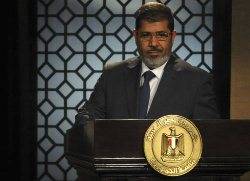Egypt's president-elect, Mohammed Mursi, has moved into his new office in the presidential palace and begun work forming a government he says will represent all of the people.
The Muslim Brotherhood candidate, who defeated ex-PM Ahmed Shafiq, could be sworn in by the end of the month.
However, the ruling military council has taken many presidential powers and questions about his authority remain.
A new constitution, the economy and security will be his main priorities.
'Stability'
The prime minister appointed by the military rulers, Kamal el-Ganzouri, met Mursi on Monday to resign formally and assume caretaker duties until the new president's team is in place.
One of Mursi's campaign spokeswomen, Nermine Mohammed Hassan, told AFP: "He has already started with a list of names he is considering. He says he will declare the cabinet soon."
Another Mursi spokesman, Yasser Ali, said the president's key concern was political stability.
State television showed Mursi meeting on Monday with Field Marshal Mohamed Hussein Tantawi, the head of the ruling military council, the Supreme Council of the Armed Forces (Scaf).
Field Marshal Tantawi said the military would "stand by the elected, legitimate president and will cooperate with him for the stability of the country".
Mursi has promised to appoint a range of vice presidents and a cabinet of "all the talents".
One key point of discussion with the Scaf will be the court-ordered dissolution of the Muslim Brotherhood-dominated parliament, which happened days before the presidential run-off vote.
Because of the dissolution of parliament, it is unclear where the new president will take his oath of office.
The Muslim Brotherhood has been seeking a partial recall of parliament so that he is sworn in before MPs. However, the Mena news agency quoted a Muslim Brotherhood spokesman as saying the oath would be taken before the Supreme Constitutional Court.
Emad Abdel-Ghaffour, head of the Islamist al-Nour party, told Associated Press that although the election result had eased the tension, there was still much mediation needed between the Islamists and the Scaf on the president's powers.
Shares on Egypt's main EGX30 index soared on Monday in the first trading since the results were announced, sparking a half-hour suspension. The halt in trading is triggered by a mechanism designed to prevent market fluctuations greater than 5%.
Gains continued on the restart, with the EGX30 on the Egyptian Exchange closing 7.6% up.
'Milestone'
In his victory speech on Sunday, Mursi, 60, urged Egyptians "to strengthen our national unity" and promised an inclusive presidency.
"There is no room now for the language of confrontation," he said, after the election authorities declared that he had won 51.73% in the 16-17 June presidential run-off.
On hearing the news of his victory, tens of thousands of Muslim Brotherhood supporters cheered in Cairo's Tahrir Square, chanting, "Down with military rule!"
Celebrations continued into Monday, with some protesters saying they would not leave the square until parliament was reinstated.
Mursi paid tribute to the protesters who died in last year's uprising against former President Hosni Mubarak but also praised the role of Egypt's powerful armed forces.
He also said he would honor international treaties.
PHOTO CAPTION
Egypt's President-elect Mohamed Mursi speaks during his first televised address to the nation at the Egyptian Television headquarters in Cairo June 24, 2012.
BBC


 Home
Home Discover Islam
Discover Islam Quran Recitations
Quran Recitations Lectures
Lectures
 Fatwa
Fatwa Articles
Articles Fiqh
Fiqh E-Books
E-Books Boys & Girls
Boys & Girls  Hajj Rulings
Hajj Rulings Hajj Fatwas
Hajj Fatwas














